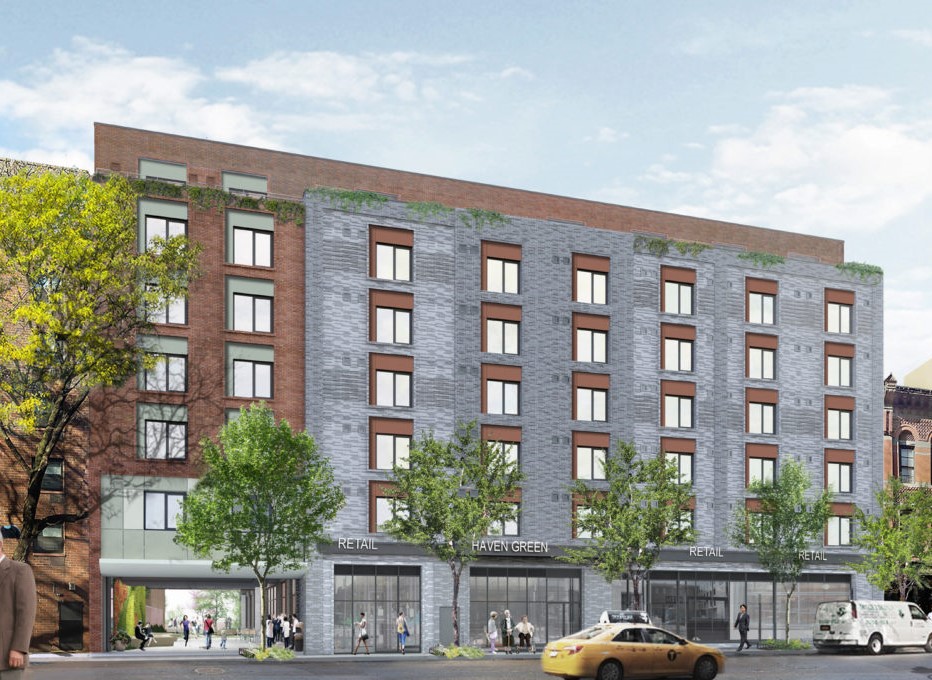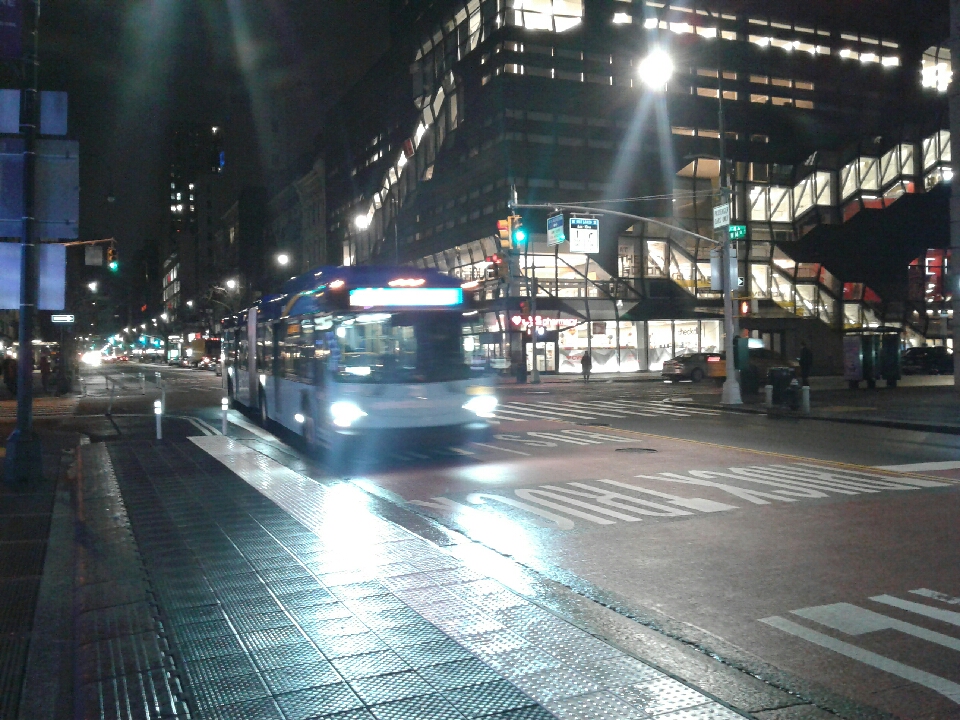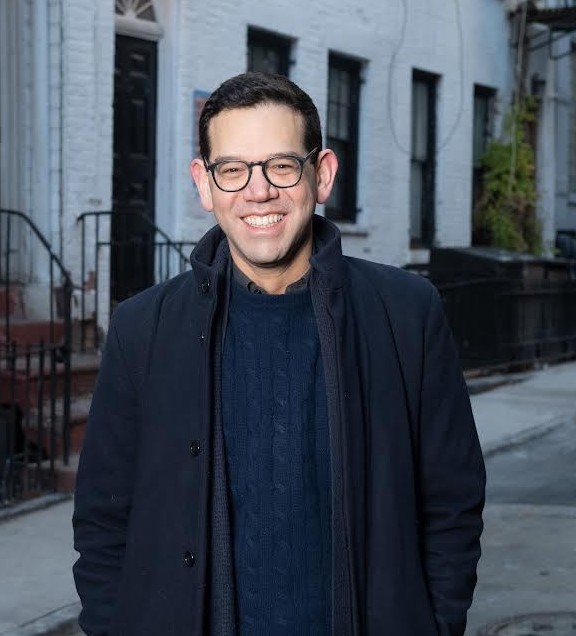BY LINCOLN ANDERSON | Ryder Kessler, a young politico endorsed by Open New York, among others, is running against longtime incumbent Assemblymember Deborah Glick in the Democratic primary election. The election date is set — at least for now — for June 28. This is Kessler’s first race for elected office.
The 66th Assembly District includes Greenwich Village, Soho, Noho, Hudson Square, Tribeca and a bit of the East Village.
The candidate recently met with The Village Sun for an interview at an outdoor table at Café Kitsuné, at Hudson and Perry Sts.
Born at St. Vincent’s Hospital, Kessler, 36, grew up north of Union Square at 18th Street and Fifth Avenue above what used to be a Barnes & Noble bookstore.
He was raised in what he called an active, “politically progressive household.”
For education, he attended Friends Seminary, Hunter College High School, Harvard for undergraduate and then did four years of Ph.D. work at Columbia, thinking he would be a professor of 19th- and early 20th-century English and American fiction. Instead, though, he wound up lauching a company, DipJar, that allows digital tipping.
“I’m a frequent customer of coffeeshops, and this was before iPads at point of sale,” he explained. As people increasingly were going cashless for their purchases, baristas told him the tips in their tip jars were sinking by 50 cents an hour. The DipJar units are preset to a certain amount, such as $1, making tipping easy. Nonprofits also use the units, like the L.G.B.T. Center, which has them set to higher dollar amounts.
“It’s essentially a tip jar for credit cards, Kessler explained.
After serving as DipJar’s C.E.O. for six years, he passed the reins and took the plunge into political activism. More could be done, he felt, to help “close the gap” the counterpersons were experiencing.
“What the baristas needed was a $15 minimum wage” and more affordable housing, among other things, he noted.
Also spurring him into politics was the 2016 election and Donald Trump. He initally worked with Flippable, a group working to turn red states to blue, as a strategic adviser.
Next he managed a congressional campaign in 2018 in the Southern Tier of New York, in a red district, as part of the effort to take back the House.
Kessler then worked as a voter protection director in Maine in 2020.
Mixed in with this, he had been appointed to Greenwich Village’s Community Board 2, serving on it for all of 2019. He then took a break to do political work, but rejoined the board last year.
He currently is campaigning full time. Glick recently took a dig at him, asking if he had a job while noting that she can’t campaign as much in the district because she’s working four days a week in Albany.
Kessler’s top three campaign issues are housing, use of the streets / transit and rethinking public safety.
During the interview, he became particularly passionate when speaking about housing, noting it’s one of the issues he has been “centering.” He unabashedly fully endorses the Open New York platform. Like Open New York, he has one answer for New York City’s housing issues: “Housing abundance.”
“As progressives, we talk about housing as a human right,” he said. “Progressives like AOC are advocating for housing abundance as a solution.”
He supports inclusionary zoning and creating more housing near transit hubs.
“I think evidence is very clear that building more housing, both market-rate and affordable, ultimately lowers prices for everyone,” he said, echoing the Open New York line. “It makes the city more affordable for everyone and takes off the pressure of displacement in other areas. We have built a million fewer units in the last 50 years than the proceeding 50 years, and that’s a supply crisis. We need more housing of all types.”
Its critics, however, call Open New York — which was founded by real estate investor Ben Carlos Thypin — an “astroturf” organization that professes concern about affordable housing but ultimately just wants to “Build, baby, build!”
Kessler’s position on housing puts him directly at odds with C.B. 2 on some high-profile land-use struggles within the district, including the fate of the Elizabeth Street Garden and the Soho/Noho rezoning.
On the former, he supports the Haven Green senior affordable housing project slated for the garden, describing the choice as “the values of a semi-public garden versus an all-affordable development for low-income seniors.”

Kessler said the city’s plan for the Little Italy green oasis was on the agenda at his first C.B. 2 meeting as a member in 2019, and that he then went by Elizabeth Street to check out the garden the following weekend: “I wasn’t able to get in, it was closed,” he said.
The community board is firmly on record in support of saving the garden, but Kessler backs the housing plan.
“I think we need a tremendous amount of more housing, especially for people who are vulnerable — low-income housing,” he said. “I completely appreciate the preferences of the people that want to save the garden. But I think that housing for low-income seniors is something we desperately need more of.”
Kessler was not serving on C.B. 2 when it voted on the Soho/Noho rezoning. But unlike the board and most of the Soho/Noho residential community, which overwhelmingly opposed the contentious scheme, he strongly supports it.
“I think the key aspect of the Soho/Noho rezoning was legalizing more housing density in a high-opporutnity, high-transit area of the city,” he said.
“We need to be much bolder, we need to be much more energetic,” he said, regarding housing. “This is a real crisis that has tremendous consequences in terms of people being priced out of the city, priced out of their homes and ending up in shelters or on the street, having to live farther away from their jobs and having to drive more and creating more carbon emissions.”
Kessler’s second issue is, as he put it, “streetscape and transit,” or as he said, “the need to address the asymmetry between car dominance of the streets and alternative modes of transit that are more sustainable and more equitable.
“We have 19,000 miles of car lanes in New York City and 544 miles of protected bike lanes,” he said. “And so it is just not safe to use alterantive modes of transportation, and it’s also not safe to be a pedestrian. Last year was the most unsafe year of the Vision Zero era.”
Asked if he considers on-street parking “free car storage,” he said yes — and that the city has too much of it.
“The parking spaces equate to 12 Central Parks, which is a mind-boggling statistic,” he said. “We know that right now we’re inducing car usage. When we have millions of free parking spaces, we are subsidizing car usage and making it more attractive. When we have 19,000 miles of car lanes, we are making driving more attractive. Ninety-four percent of people in this district do not commute by car.”
Kessler also supports the creation of more protected bike lanes and busways.
“I think the 14th St. busway has been amazing,” he said. “It’s incredibly successful.”
Asked where more busways should be added in C.B. 2, he said, “I hesitate to list the streets but I think we need to think about how we can replicate that success.”

He would like to see more parking spaces used for things like trash containerization and outdoor dining. The interview was the day after state Supreme Court Justice Frank Nervo ruled in favor of a lawsuit against the city’s outdoor dining program, arguing it must undergo a proper environmental review. However, Kessler is a big fan of the program.
“To me, it’s been a resounding success and has supported all of these local businesses, the 100,000 service workers they emply, the kind of people I started DipJar to help,” he said.
He conceded that, in some cases, accessibility to the dining sheds and the structure of the sheds themselves could be improved. However, he stressed of the pandemic emergency-inspired program, “We need to preserve it… . It’s so popular.”
Glick, on the other hand, has been outspokenly critical of the initiative, saying it must be reined in. Again, Kessler is at odds with the local community board on which he serves, which, like the majority of the city’s community boards, voted against making Open Restaurants permanent.
His third main campaign issue is public safety — or more accurately, how it can be reimagined.
“A carceral, punitive approach to society does not serve the public safety and, in fact, further victimizes marginalized communities,” he said. “I want to see the city go further in addressing the scourge of overpolicing and mass incarceration.”
One thing he doesn’t support is any weakening of the bail reform enacted by Albany.
“There are many more steps we must take to make our neighborhoods safer, starting with the bold investments in housing, healthcare and jobs proven to reduce violent crime,” he said. “One step that will not help is rolling back bail reform. All evidence confirms that it is unrelated to rising crime nationwide during the pandemic — and that more pretrial detention leads to more violence, not less. Any elected official staying on the sidelines of this conversation — rather than making a clear case against criminalizing poverty rather than criminality — is failing to live up to any progressivism they might claim.”
Glick was the first openly gay or lesbian member elected to the state Legislature when she won election in 1991. Asked if he respected Glick as a trailblazer and the work she has done, Kessler said yes, but that now it’s “time to do more.”
“I’m a gay man,” he said. “The fact that she was a pioneer in the Legislature is something I will always appreciate. I think the question today is what are we doing to advocate for the most marginalized members of society, whether that’s sex workers’ decriminalization or truly addressing housing affordability. Forty percent of homeless youth are L.G.B.T.Q.”
Kessler noted that, after Democrats won control of the state Senate in 2018, “I saw a new class of progressives come in and demand bolder vision. It led to lots of changes.
“The Assembly is now the place where bold progressive policies stall out,” he charged. “We need new energy and bolder vision in the Assembly.”
Kessler is also endorsed by the Working Families Party and the Jim Owles Liberal Democratic Club, among others. Transit guru Charles Komanoff also is backing Kessler and is throwing him a fundraiser at his Tribeca loft on Wed., May 10.
“On implementing congestion pricing, Glick is tepid, at best,” Komanoff said in an invite for the event. “Ryder is all-in on this dynamic policy to dethrone King Car and make our streets safer and our transit better.”
Unlike many young political challengers, though, Kessler is not endorsed by the Democratic Socialists of America. It wasn’t exactly clear why and Kessler’s campaign did not give a reason, but one Kessler supporter cited D.S.A.’s anti-Israel stance.
A member of the Hudson River Park Friends, an advocacy and fundraising group for the West Side waterfront park, who requested anonymyity, said she supports Kessler. Glick, taking a stand as the defender of the waterfront, has generally opposed big commerical development plans in the park, to the chagrin of the Friends.
“Eventually, Pier 40’s going to come back to the front burner,” the activist noted.
She clearly feels Kessler, if elected, would be more amenable than Glick to the Friends’ position on the waterfront park.


We don’t need affordable housing, we need PUBLIC Housing and we don’t need businesses, small or large, to take over our public spaces, i.e., the sidewalks and streets. You can barely walk down a sidewalk these days due to the usurping of public walkways to restaurants.
Appreciate this. As Kessler is clearly in the pocket of the real estate lobby, I will emphatically not be voting for him.
My remaining nagging question: What the hell does it say about the Working Families Party that it endorsed him?
Yes, good question on WFP. I remember all too well that they supported Cuomo with his fake Women’s Party over Teachout. They are proving themselves to be a fake alternative and just more of the same
What are positions on abortion and guns?
He was raised in what he called an active, “politically progressive household.”
What exactly is a politically progressive household?
For education [we know not for work experience] Ryder attended Friends Seminary, Hunter College High School, Harvard for undergraduate and then did four years of Ph.D. work at Columbia, thinking he would be a professor of 19th- and early 20th-century English and American fiction. Instead, though, he wound up launching a company, DipJar, that allows digital tipping. [What did Ryder do after DipJar? Was he bought out? Is he still an owner of the company? How does Ryder earn a living? We can assume not from writing book reviews.]
Where was Ryder Kessler when rioters rampaged through Soho and the South Village?
No one knows what Kessler does for a living. He refuses to divulge it, His company went nowhere.
But according to the NYS Board of Election Campaign Finance website, he has donated $65,000 of his own money to his campaign. $65,000!!!
How does a guy with no job get $65,000 to get himself elected to represent us proles who must work hard to pay our bills? Another little rich kid trying to buy an election? Sounds like it.
C’mon Ryder, ‘fess up. Is it Daddy or is it Mommy who supports you? Have you ever done an honest day’s work in your life?
Where does Kessler officially stand on having a homeless shelter in the West Village? At the March 2022 CB2 meeting he boldly declared, “I wish I had a shelter like this (referring to 231 Grand St., which was planned as a low-threshold, harm-reduction site, with drug use allowed) in my neighborhood, on my street.” Still waiting for details on that.
Why? Can you do a better job? Go back to your business.
Glick does a better job.
Always thought he was a very bright kid but oh so disappointed in his political positions. Born and raised in the Fifth and 14th ‘hood; he should know better than to buck and ignore what we other locals want from our community. Sadly, he will not get my vote.
What if we take a different approach and create some affordable housing by passing a law that any co-op or condo owner can only sell their apartment at a price affordable to someone who makes $28,000 a year (30% AMI)?
The amount of housing built is not the solution. IMO, it’s the amount of truly affordable housing that is available. When the developers built the oversized residential buildings without regard for the existing neighborhood community, they included what they (and some politicians call) affordable housing that no one I know in the Village or anywhere in Lower Manhattan can actually afford.
What is the relationship between the size (oversized, as you put it) and the affordability? There is no new affordable housing built in the Village because there has been no political will to do so.
The amount of housing built is absolutely one part of the solution. It’s a big problem that market-rate housing isn’t affordable to people making under 130% AMI. The reason market-rate housing is so expensive is that there isn’t enough of it, with the region underbuilding relative to population growth for decades. We’ll always need subsidized housing for some, but money for subsidies is limited and should be given to those who need it most. For everyone else, we have to make market-rate housing more affordable by building more of it.
Absolutely! Who writes the legislation telling New Yorkers what is affordable? Big Real Estate runs NYC (REBNY) and that must change.
Do any politicians have the courage to do that?
I do not agree with anything I hear from Ryder Kessler. No thank you. Deborah Glick is my choice.
Lower Manhattan ain’t keen on any OpenNY-constructed candidates: For someone who grew up near there, Ryder remains woefully out of touch with voters.
Do you have any evidence that Gay, Bold, Progressive Ryder Kessler ever grew up?